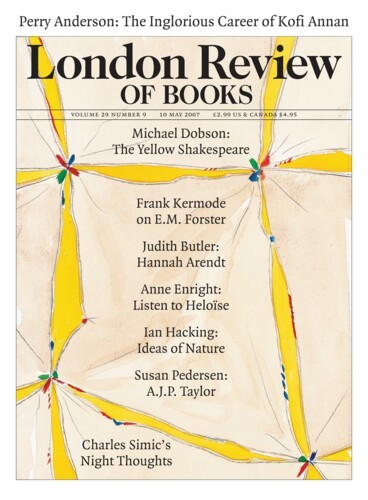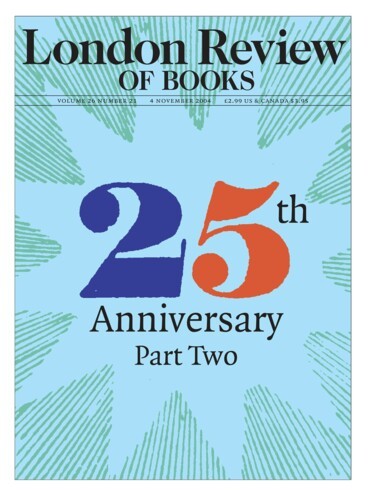Among the many astonishing claims that Barack Obama made in his recent speech opposing the Palestinian bid for statehood was that ‘peace will not come through statements and resolutions.’ This is, at best, an odd thing to say for a president whose ascendancy to power itself depended on the compelling use of rhetoric. Indeed, his argument against the power of statements and resolutions at the United Nations to achieve peace was a rhetorical ploy that sought to minimise the power of rhetorical ploys. More important, it was an effort to make sure that the United States government remains the custodian and broker of any peace negotiation, so his speech was effectively a way of trying to reassert that position of custodial power in response to the greatest challenge it has received in decades. And most important, his speech was an effort to counter and drain the rhetorical force of the very public statements that are seeking to expose the sham of the peace negotiations, to break with the Oslo framework, and to internationalise the political process to facilitate Palestinian statehood.
Judith Butler
Judith Butler is a Distinguished Professor in the Graduate School at the University of California, Berkeley, where they have taught since 1993. They are the author, most famously, of Gender Trouble: Feminism and the Subversion of Identity (1990) and Bodies that Matter: On the Discursive Limits of ‘Sex’ (1993). Their other books include Frames of War: When Is Life Grievable? (2009), Parting Ways: Jewishness and the Critique of Zionism (2012), The Force of Nonviolence: An Ethico-Political Bind (2020), What World Is This? A Pandemic Phenomenology (2022) and Who’s Afraid of Gender? (2024). They gave an LRB Winter Lecture in 2011 entitled ‘Who owns Kafka?’ and appear on the LRB’s Close Readings podcast series ‘Human Conditions’.
Who Owns Kafka?
Judith Butler, 3 March 2011
An ongoing trial in Tel Aviv is set to determine who will have stewardship of several boxes of Kafka’s original writings, including primary drafts of his published works, currently stored in Zurich and Tel Aviv. As is well known, Kafka left his published and unpublished work to Max Brod, along with the explicit instruction that the work should be destroyed on Kafka’s death. Indeed, Kafka had apparently already burned much of the work himself. Brod refused to honour the request, although he did not publish everything that was bequeathed to him. He published the novels The Trial, The Castle and Amerika between 1925 and 1927. In 1935, he published the collected works, but then put most of the rest away in suitcases, perhaps honouring Kafka’s wish not to have it published, but surely refusing the wish to have it destroyed. Brod’s compromise with himself turned out to be consequential, and in some ways we are now living out the consequences of the non-resolution of Kafka’s bequest.
I was glad to see in today's press that it was decided to separate the question of what sex Caster Semenya really is from the questions of whether she could keep her medal or compete in women's sports. It seemed to me that the drive to publish the results of the sex determination tests was always sensationalist and intrusive, and that it missed the important points at issue in this situation. Yesterday's decision by the IAAF goes part of the way to honour the complexity and vulnerability of the person here, but also to affirm the way her gender is bound up with cultural and familial modes of belonging and recognition.
‘I merely belong to them’: Hannah Arendt
Judith Butler, 10 May 2007
‘You know the left think that I am conservative,’ Hannah Arendt once said, ‘and the conservatives think I am left or I am a maverick or God knows what. And I must say that I couldn’t care less. I don’t think the real questions of this century get any kind of illumination by this kind of thing.’ The Jewish Writings make the matter of her political affiliation no easier to settle. In these editorials, essays and unfinished pieces, she seeks to underscore the political paradoxes of the nation-state. If the nation-state secures the rights of citizens, then surely it is a necessity; but if the nation-state relies on nationalism and invariably produces massive numbers of stateless people, it clearly needs to be opposed. If the nation-state is opposed, then what, if anything, serves as its alternative?
Jacques Derrida: commemorating ‘one of the greatest philosophers of the 20th century’
Judith Butler, 4 November 2004
“If his critics worried that, with Derrida, there are no foundations on which one could rely, they doubtless were mistaken. Derrida relies perhaps most assiduously on Socrates, on a mode of philosophical inquiry that took the question as the most honest and arduous form of thought. ‘How do you finally respond to your life and to your name?’ . . . Is there justice to be done to a life? That he asks the question is exemplary, perhaps even foundational, since it keeps the final meaning of that life and that name open. It prescribes a ceaseless task of honouring what cannot be possessed through knowledge . . . Indeed, now that Derrida, the person, has died, his writing makes a demand on us. We must address him as he addressed himself, asking what it means to know and approach another, to apprehend a life and a death, to give an account of its meaning, to acknowledge its binding ties with others, and to do that justly.”
Podcasts & Videos
Judith Butler: Then and Now
David Runciman and Judith Butler
This week two conversations with the feminist theorist and writer Judith Butler: one recorded the week Trump won the presidency in 2016 and one recorded a few days ago, as his presidency (just maybe) approaches...
Who Owns Kafka?
Judith Butler
Judith Butler delivers her lecture on the battle for ownership of Kafka and his manuscripts.
Pieces about Judith Butler in the LRB
Dive In! Hegelian reflections
Bruce Robbins, 2 November 2000
In 1987, three years before Gender Trouble made her the most famous feminist philosopher in the United States, Judith Butler published a book on Hegel’s dialectic of lordship and bondage...
Read anywhere with the London Review of Books app, available now from the App Store for Apple devices, Google Play for Android devices and Amazon for your Kindle Fire.
Sign up to our newsletter
For highlights from the latest issue, our archive and the blog, as well as news, events and exclusive promotions.




